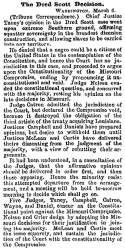Record Data
Transcription
The Dred Scott Decision.
WASHINGTON, March 6.
(Tribune Correspondence.) Chief Justice Taney's opinion in the Dred Scott case went upon extreme Southern ground, affirming squatter sovereignty in the broadest disunion construction, and allowing slaves to be carried into any territory.
He denied that a negro could be a citizen of the United States in the contemplation of the Constitution, and hence the Court has no jurisdiction in this case, and proceeded to argue upon the Constitutionality of the Missouri Compromise, ending by pronouncing it unconstitutional and void. Judge Nelson evaded the constitutional question, and concurred with the majority, resting his opinion on the late decisions in Missouri.
Judge Catron admitted the jurisdiction of the Court, but declared the Compromise void, because it destroyed the obligation of the third article of the treaty acquiring Louisiana. Justices Campbell and Daniels have prepared opinions, but desire to withhold them until Justices McLean and Curtis have delivered theirs dissenting from the judgment of the majority, with a view of rebutting their arguments.
It had been understood, in a consultation of the Judges, that the affirmative opinions should be delivered in order first, and then those opposing. Hence the minority resist this attempted departure from the arrangements, and a meeting will be held to-morrow morning to decide which shall go on.
Five Judges, Taney, Campbell, Catron, Wayne, and Daniel, concur on the Constitutional point against the Missouri Compromise. Nelson and Grier dodge by adopting the Missouri decisions for their justification in joining the majority. McLean and Curtis meet the issue squarely, and sustain the jurisdiction of the Court and the constitutionality of the Compromise.












